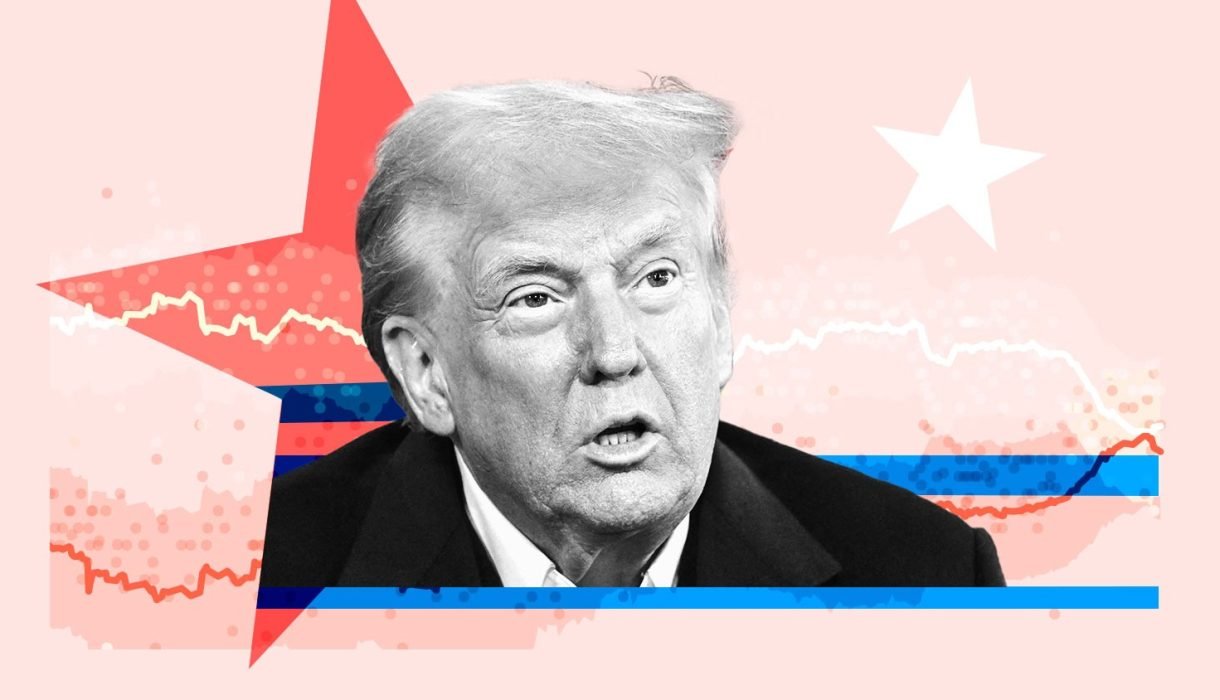
Trump’s Poll Plunge: Insights from Karl Rove
Posted in :
Karl Rove highlights Trump’s steep polling decline, linking it to voter anger over tariffs and financial burdens—raising critical concerns for the Republican Party’s future.
Karl Rove’s alarming commentary on Donald Trump’s dwindling poll numbers, emphasizing factors like trade tariffs and public sentiment, and reflects on what this means for the future of the Republican Party as the 2026 elections approach.
As I was sipping my morning coffee this weekend, I stumbled upon an intriguing remark by Karl Rove about Trump’s current standing in the polls. It got me reflecting on the intricate dance of politics and public opinion—a dance that seems particularly off-balance for Trump lately. Rove didn’t pull any punches: ‘He’s in very bad shape.’ But what does that really mean for the GOP and the upcoming elections?
Understanding Trump’s Poll Numbers
Recent polls have shown a stark decline in Trump’s approval ratings. This is not just a minor dip; it’s a significant drop that raises questions about his future. As someone who closely follows political trends, I find this alarming. Trump’s approval ratings have plummeted from 45% to 38% in just a month. That’s a steep decline, and it makes you wonder: what’s going on?
The Tariff Factor
One of the critical issues at play is the correlation between tariffs and public sentiment. Tariffs are essentially taxes on imported goods. When these taxes go up, prices often follow. Karl Rove, a seasoned political strategist, pointed out that “the tariffs are a big problem because people understand that it is a tax and that it’s going to be a tax on them that they have to pay.”
Think about it. If you’re a voter and you see prices rising at the grocery store or the gas pump, how do you feel? Frustrated? Angry? Disenchanted? It’s no surprise that many voters are connecting the dots between tariffs and their wallets. This connection is crucial for understanding the current political landscape.
Voter Disenchantment
Are voters growing disenchanted with Trump’s policies? The answer seems to be yes. Polling analysis shows a staggering 60% disapproval among key demographics. This is not just a number; it represents real people who feel let down. They may have supported Trump in the past, but now they are questioning his decisions.
- Recent polls indicate a stark decline in Trump’s approval ratings.
- The correlation between tariffs and public sentiment is crucial.
- Are voters growing disenchanted with Trump’s policies?
As we explore these trends, it’s essential to consider the implications of Trump’s approval ratings on Republican candidates. If Trump’s numbers continue to slide, what does that mean for those running alongside him? Will they distance themselves from his policies, or will they double down? This is a pivotal moment for the Republican Party.
Exploring the Data
Let’s dive deeper into the data. The drop from 45% to 38% is not just a statistic; it’s a reflection of shifting sentiments. Voters are reacting to the policies they see affecting their daily lives. The tariffs, in particular, have become a focal point of discontent. When people feel the pinch in their pockets, they tend to express their dissatisfaction at the polls.
Rove’s analysis suggests that public sentiment is indeed a fickle friend. He stated,
“Public sentiment is a fickle friend, and right now, it seems to be a very bad friend for Trump.”
This statement encapsulates the current mood. Voters are not just unhappy; they are actively reconsidering their support.
Looking Ahead
As we look ahead, it’s crucial to keep an eye on these trends. The implications of Trump’s declining approval ratings could be far-reaching. Republican candidates may need to adapt their strategies to align with the changing sentiments of the electorate. Will they embrace Trump’s policies, or will they seek to distance themselves from him? Only time will tell.
In conclusion, the current polling numbers are alarming. They reflect a significant shift in voter sentiment that cannot be ignored. As we continue to analyze these trends, it’s essential to remain aware of how they might impact the political landscape moving forward.
The Impact of Tariffs on Public Sentiment
When we think about tariffs, what comes to mind? For many, they are seen as a financial burden rather than a protective measure. This perception is crucial. It shapes how voters feel about economic policies and, ultimately, their choices at the ballot box.
Understanding Tariffs
Tariffs are taxes imposed on imported goods. They are meant to protect domestic industries by making foreign products more expensive. However, the reality is that these taxes often end up costing consumers more. When we pay higher prices for goods, we feel the pinch in our wallets. This is why many people view tariffs negatively.
- Financial Burden: Tariffs are increasingly seen as a tax that consumers must pay.
- Public Dissatisfaction: As people understand tariffs better, their dissatisfaction grows.
- Voter Choices: Economic policies, including tariffs, can significantly influence how people vote.
Public Sentiment and Economic Policies
Recent surveys reveal a troubling trend. Support for tariffs has dropped from 35% to 25%. This decline indicates a shift in public sentiment. People are becoming more aware of how tariffs affect their daily lives. In fact, 80% of consumers believe that tariffs lead to higher prices. This is a significant number. It shows that the average voter is not just passive; they are actively engaging with economic issues.
As a political economist once said,
‘Economic policy is often perceived through the lens of personal finance.’
This statement rings true. When voters see tariffs as a direct hit to their finances, they become more vocal about their dissatisfaction. It’s not just about politics; it’s about their everyday lives.
Examples of Tax Implications
Let’s consider some examples. When taxes increase, whether through tariffs or other means, voters often react. They may feel that their financial security is threatened. This can lead to a shift in their political allegiance. For instance, if a candidate supports tariffs, they might lose votes from those who feel the financial strain. It’s a delicate balance.
Moreover, tariffs are not the only economic policy that can sway voters. Other tax implications, such as income tax changes or sales tax increases, can also play a significant role. Voters are keenly aware of how these policies affect their wallets. They want to know: Will this policy help me or hurt me?
The Role of Political Advisors
Political advisors like Karl Rove have pointed out the dangers of tariffs. Rove emphasizes that tariffs function as a tax burden. This resonates negatively with everyday voters. When people feel that their financial situation is at risk, they are less likely to support the politicians who advocate for such policies.
Rove’s insights highlight a critical point: the connection between economic policies and election outcomes. If voters perceive tariffs as detrimental to their finances, they may choose to support candidates who promise to eliminate or reduce these taxes. This is a powerful motivator in the political landscape.
In summary, the impact of tariffs on public sentiment cannot be overstated. As voters become more informed, their dissatisfaction with tariffs grows. They see these taxes as a burden, not a protective measure. This shift in perception can have significant implications for political candidates and their campaigns. Understanding this dynamic is essential for anyone looking to navigate the complex world of economic policy and voter sentiment.
What Lies Ahead for the Republican Party?
The Republican Party is at a crossroads. With the 2026 elections looming, the question on everyone’s mind is: what lies ahead for the GOP? As we analyze the current political landscape, we must consider potential strategies the party might employ to revive support. We also need to examine the role of other Republican candidates and whether Trump can regain his footing or if it’s time for a new face to lead the party.
Reviving Support: Potential Strategies
To regain lost ground, the GOP must rethink its approach. Here are some potential strategies:
- Embrace New Issues: The party needs to address contemporary concerns like climate change and healthcare. Ignoring these topics could alienate younger voters.
- Focus on Local Matters: Candidates should prioritize local issues that resonate with constituents. This could mean advocating for better schools or infrastructure improvements.
- Engage with Diverse Communities: The GOP must broaden its appeal by reaching out to minority groups. This can be achieved through community events and inclusive messaging.
As political analyst noted,
‘The GOP must adapt quickly; the old strategies may not work anymore.’
This is a wake-up call for the party. If they cling to outdated tactics, they risk further alienation from the electorate.
The Role of Other Republican Candidates
In the 2026 election landscape, other Republican candidates will play a crucial role. With Trump’s fluctuating popularity, the emergence of fresh faces could shift the dynamics significantly. Candidates like Ron DeSantis and Nikki Haley are already making waves. They bring new ideas and perspectives that could attract voters who are tired of the same old rhetoric.
But can these candidates truly challenge Trump’s influence? It’s a delicate balance. They must appeal to his base while also carving out their own identities. This is no easy feat. The party is still very much divided. Some voters remain staunchly loyal to Trump, while others are ready for a change.
Can Trump Regain Support?
As assessments of Trump’s popularity evolve, we must ask: can he regain support? Historical data shows that incumbent presidents often face challenges in re-election when their approval ratings drop below 40%. Currently, Trump’s numbers are concerning. His policies, including tariffs, have drawn criticism. Many see them as a tax burden on the average American.
Trump’s ability to bounce back will depend on several factors. He needs to reconnect with voters who feel disillusioned. This means addressing their concerns directly and showing that he understands their struggles. If he can do this, there’s a chance he could rally his base once again.
Historical Parallels and Future Predictions
Looking back at history, we can see parallels in Republican party dynamics. For instance, after the Watergate scandal, the GOP faced a significant decline. Yet, they managed to regroup and come back stronger. This time, the party must learn from past mistakes. They need to be proactive rather than reactive.
As we look to the future, predictions are mixed. Some believe the GOP will adapt and thrive, while others fear it may continue to struggle. The key will be how well they can navigate the current political climate. Will they embrace change, or will they cling to the past?
The Republican Party stands at a pivotal moment. The strategies they choose to implement will determine their success in the upcoming elections. With the emergence of new candidates and the ongoing influence of Trump, the landscape is shifting. The party must adapt to the changing needs of the electorate. If they can do this, they may just find a way to revive support and secure a brighter future. The stakes are high, and the time for action is now. Will the GOP rise to the occasion? Only time will tell.
TL;DR: Karl Rove warns that Trump’s declining poll numbers are serious, attributing some of the fall to tariffs and their perceived burden on voters. This situation may have significant implications for the GOP as we head into the 2024 elections.
RepublicanStrategies, BushAdviserInsights, TrumpPollNumbers, 2024Election, TrumpPresidency, PoliticsInAmerica, VoterSentiment, TariffsImpact, PoliticalAnalysis, KarlRove
#TariffsImpact, #TrumpPresidency, #VoterSentiment, #2024Election, #KarlRove, #PoliticsInAmerica, #TrumpPollNumbers, #PoliticalAnalysis, #BushAdviserInsights, #RepublicanStrategies,#DonaldTrump, #KarlRove, #RepublicanParty, #Tariffs, #VoterSentiment, #2024Elections, #PoliticalAnalysis, #GOP

